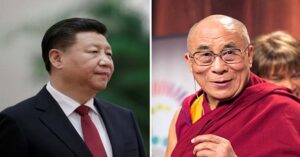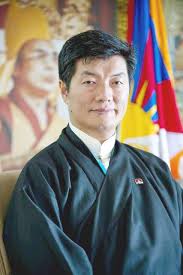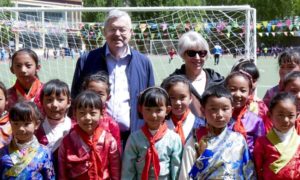 The 31st task force meeting on Sino-Tibet negotiations was held on May 15 – 16. The two-day meeting at the Tibetan government headquarters in Dharamshala concluded that the exile Tibetan Government, officially known as the Central Tibetan Administration (CTA), seeks genuine autonomy under China through the Middle Way Approach.
The 31st task force meeting on Sino-Tibet negotiations was held on May 15 – 16. The two-day meeting at the Tibetan government headquarters in Dharamshala concluded that the exile Tibetan Government, officially known as the Central Tibetan Administration (CTA), seeks genuine autonomy under China through the Middle Way Approach.
The Middle Way approach, proposed by His Holiness the Dalai Lama, entails taking a non-partisan and moderate position that safeguards the vital interests of all concerned parties. The task force said this remains the core goal and means of the CTA to find a mutually acceptable resolution.
The task force was constituted in 1999 to implement peaceful dialogue with the People’s Republic of China (PRC) on the issue of Tibet. The last round of talks with China took place in January 2010 but failed to result in any resolution due to major differences between the representatives of the Dalai Lama and the United Front Work Department of the Central Committee of the Communist Party of China.
After nine rounds of meeting, talks between the two sides stopped in 2010. The two envoys of His Holiness the Dalai Lama, Lodi Gyari and Kelsang Gyaltsen, resigned in June 2012 citing lack of genuine conviction to resolve the issue from Beijing.
 Sikyong Lobsang Sangay, President of the CTA, who took up his post in March 2011 and who presided over the Task Force meeting, said relations between the two sides broke down after the 2010 talks but since then China has kept open informal channels of dialogue with the exiled Tibetan leadership. The Task Force has met nine times under his leadership.
Sikyong Lobsang Sangay, President of the CTA, who took up his post in March 2011 and who presided over the Task Force meeting, said relations between the two sides broke down after the 2010 talks but since then China has kept open informal channels of dialogue with the exiled Tibetan leadership. The Task Force has met nine times under his leadership.
Commentary on the Chinese news site, news.cgtn.com, said the main reason the talks from 2002 to 2010 failed was due to the “deliberate misinterpretation of the Dalai clique of the preconditions of the central government about the subject and theme of negotiations.” The statement continued, “There has always been a precondition drawn by the central government of China that talks should be held with personal representatives of the Dalai Lama on his destiny and that of the people around him, rather than with the so-called Tibetan government in exile on the autonomy of Tibet”. The commentary concluded that “without common grounds, no talk or dialogue could proceed, let alone achieve any positive outcomes.”
In 1950, Beijing sent troops into Tibet – until then independent – and has since claimed that under their rule, Tibet has been “peacefully liberated” and brought into the modern era despite numerous documented actions of repression.China sees the Dalai Lama, who crossed the border into exile in India in 1959 after a failed uprising against Chinese rule, as a dangerous “separatist”. However, he states publicly that he seeks genuine autonomy for his homeland, not independence. He remains widely revered in Tibet as well as in exile.
No Meeting
 On May 22, the private office of His Holiness the Dalai Lama denied claims that a proposed meeting between His Holiness and Chinese President Xi Jinping in New Delhi in 2014 was blocked by the Indian government as a “cautious intervention.”
On May 22, the private office of His Holiness the Dalai Lama denied claims that a proposed meeting between His Holiness and Chinese President Xi Jinping in New Delhi in 2014 was blocked by the Indian government as a “cautious intervention.”
This was in response to a revelation made by Indian Journalist Sonia Singh in her book Defining India: Through their eyes, published on May 20. In the book, the 83-year old Nobel laurate was quoted as saying in an interview with Ms Singh, “In 2014, when Chinese President Xi Jinping visited Delhi for talks with Prime Minister Modi, I requested a meeting with him. President Xi Jinping agreed, but the Indian government was cautious about the meeting, so it didn’t happen.”
However, a senior Indian official and secretary in a statement said that although a meeting was proposed by the Tibetan side, the Chinese never agreed to it. “Although we had proposed a meeting between His Holiness and President Xi Jinping during his visit to India in 2014, the Chinese authorities had not given a definite response. Therefore, there was no basis for the government of India being cautious of the initiative,” he noted.
Calls for China to Talk to the Dalai Lama

US Ambassador to China Terry Branstad and his wife Christine with school children as he visits an elementary school in Lhasa, Tibet on May 22.
Photo: The Epoch Times
Governments around the world have called on China on numerous occasions to talk to the representatives of His Holiness the Dalai Lama. In a first since 2015, the United States Ambassador to China Terry Branstad has visited Tibet where he criticised the Chinese government for interfering in religious freedom and urged them to hold talks with the Dalai Lama.
Read more about Mr Branstad’s visit to Tibet (here).




 Print
Print Email
Email